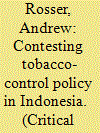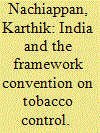|
|
|
Sort Order |
|
|
|
Items / Page
|
|
|
|
|
|
|
| Srl | Item |
| 1 |
ID:
139444


|
|
|
|
|
| Summary/Abstract |
Over the past decade and a half, the Indonesian government has progressed fitfully and inconsistently toward a stricter tobacco-control policy regime, albeit without much impact on the country's worsening tobacco epidemic. This article explains this pattern of reform in terms of the unequal but changing relationship of power between tobacco companies and tobacco farmers, on the one hand, and tobacco-control advocates based in NGOs, health professional organizations, universities, and international organizations, on the other. The first of these coalitions has had greater structural leverage, better political connections, stronger organizational capacity, greater ability to mobilize popular forces, and more capacity to cultivate a positive public image. But the second coalition has been able to exercise some influence over policy because of changes wrought by democratization. In this analysis, the author engages with the literatures on (1) Indonesia's political economy in the post–New Order period and (2) the politics of tobacco control in developing countries. With regard to the former, the author argues that we need to give greater attention to the role of actors previously excluded from the policy-making process than is currently the case. With regard to the latter, the author contends that more focus is needed on domestic actors and political institutions in shaping tobacco-control policy. Looking to the future, the author suggests that further progress in Indonesia's tobacco-control policies will be contingent upon an ongoing process of struggle; however, there are signs that the tide is turning in favor of the second coalition.
|
|
|
|
|
|
|
|
|
|
|
|
|
|
|
|
| 2 |
ID:
185098


|
|
|
|
|
| Summary/Abstract |
This paper investigates why India actively negotiated and ratified the Framework Convention on Tobacco Control (FCTC), the first global health treaty to curb tobacco use worldwide. The World Health Organization’s (WHO) decision to conduct FCTC negotiations aligned with India’s shifting disease burden that was pivoting from infectious to non-communicable diseases, particularly cancer, which shot up due to surging tobacco use. The WHO’s decision to frame the agreement around constraining global tobacco commerce, particularly the might of multinational tobacco companies, meshed with the interests of New Delhi, which was concurrently seeking to curb surging tobacco consumption. This triggered a positive approach and attitude to FCTC negotiations, leading to India’s ratification. India’s negotiation and ratification of the FCTC shows that the literature(s) on rising powers and international organizations must consider how factors like the WHO’s institutional politics, specifically the intent to negotiate a focused global agreement to curb tobacco production and distribution worldwide, affects how countries perceive and seek to use that agreement to bolster domestic policy concerns like tobacco control.
|
|
|
|
|
|
|
|
|
|
|
|
|
|
|
|
| 3 |
ID:
116676


|
|
|
|
|
| Publication |
2012.
|
| Summary/Abstract |
Globalization has led to new health challenges for the twenty-first century. These new health challenges have transnational implications and involve a large range of actors and stakeholders. National governments no longer hold the sole responsibility for the health of their people. These changes in health trends have led to the rise of global health governance as a theoretical notion for health policy making. The Southeast Asian region is particularly prone to public health threats such as emerging infectious diseases and faces future health challenges including those of noncommunicable diseases. This study looks at the potential of the Association of Southeast Asian Nations (ASEAN) as a regional organization to lead a regional dynamic for health cooperation in order to overcome these challenges. Through a comparative study with the regional mechanisms of the European Union (EU) for health cooperation, we look at how ASEAN could maximize its potential as a global health actor. Our study is based on primary research and semistructured field interviews. To illustrate our arguments, we refer to the extent of regional cooperation for health in ASEAN and the EU for (re)emerging infectious disease control and for tobacco control. We argue that regional institutions and a network of civil society organizations are crucial in relaying global initiatives, and ensuring the effective implementation of global guidelines at the national level. ASEAN's role as a regional body for health governance will depend both on greater horizontal and vertical integration through enhanced regional mechanisms and a wider matrix of cooperation.
|
|
|
|
|
|
|
|
|
|
|
|
|
|
|
|
|
|
|
|
|